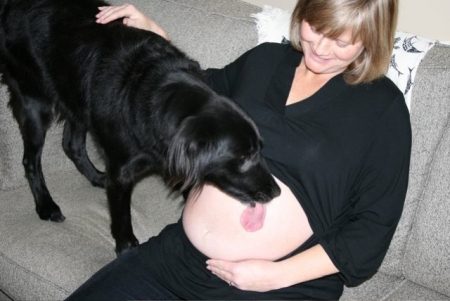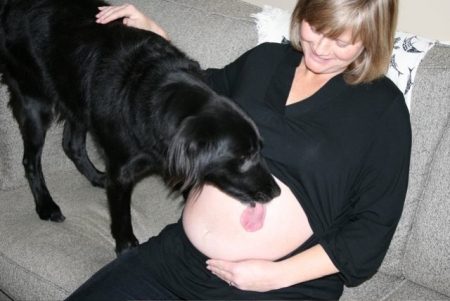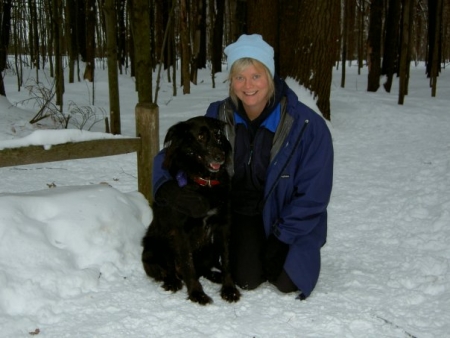

Training a dog to welcome a new baby isn’t labour intensive
When the baby you’ve had for years gets a sniff of the new baby you’re bringing home for the first time, it’s only natural for a tinge of jealousy to set in.
A former journalism school classmate of mine emailed me this photograph today because she knew I’d appreciate it.
“My husband wanted to take a few snaps, and there was such an expanse of flesh that Lily decided to take advantage of it,” Kanina told me over the phone lines from Petawawa, Ontario. It was a picture-perfect moment with her 11-year-old dog.
Like me, Kanina is incensed when people discard their pets because their “real children" have come along, quickly forgetting that it was their beloved animals who supplied loyal company before they had a nuclear family to depend on.
“It drives me nuts when people have kids and neglect their pets,” says Kanina, who is now a journalism professor at Carleton University. “I don’t want to put Lily a notch lower just because there’s a baby in the house. I don’t want her to feel replaced and not wanted anymore.”
The Humane Society of United States offers suggestions on its website for introducing a companion animal to a new baby. Months before the baby is due, play recordings of babies crying. Put new items purchased for the child into use so the dog can get used to them, such as rocking chairs and mechanical baby swings. Talk to your pet about your new baby, using his or her name if you’ve already picked one out. Sprinkling baby powder or oil on your skin will help the dog get used to unfamiliar scents.
Kanina and Lily have been together through thick and thin for more than a decade. She adopted the Border Collie/Black Labrador cross from a Winnipeg, Manitoba shelter as a three-month-old puppy. To prepare for the the baby – whose arrival on Earth was originally anticipated for this past Monday, by the way – Kanina has been training Lily using a clicker, a popular method applied in reward-based dog training.
“Lily is a social dog. She just wants to feel included. Her pack is growing and changing, but that doesn’t have to be a bad thing.”
And Lily isn’t the only one who will be making adjustments.
“Initially she might be a little apprehensive, but that period of confusion will extend to all of us,” Kanina says. “If we just continue to love her and give her attention, she’ll be all right.”
Join the newsletter and never miss out on dog content again!
"*" indicates required fields
By clicking the arrow, you agree to our web Terms of Use and Privacy & Cookie Policy. Easy unsubscribe links are provided in every email.
